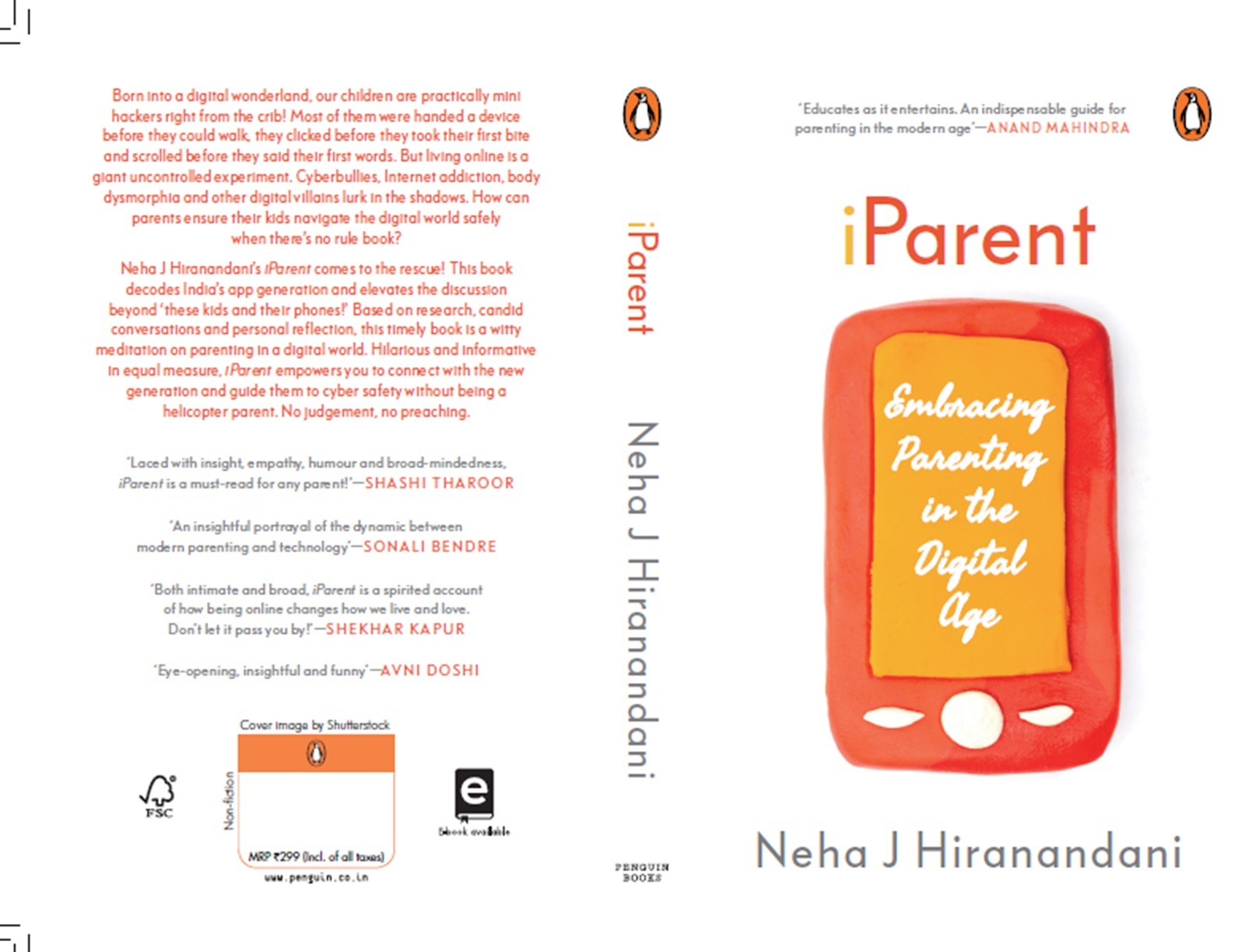Parenting is never easy, especially in the digital world with all its conflicts, challenges, information overload, and chaos. So it was not surprising that Neha J Hiranandani, an independent author and columnist, decided to pen a book on the same. Titled iParent: Embracing Parenting in the Digital Age, the book promises a digital roadmap for parenting without judgment or preaching.
“There is no precedent in human history for the impact of the internet, which means that all of us are subjects in a massive global experiment. As parents, we are particularly challenged since we’re guiding our children through a world that we barely understand ourselves. Parents have often felt that teenagers are ‘in their world’ and no phrase could be more true for GenZ who live online and are (actually) in their world! This book is an exploration of those worlds; in fact, it’s an attempt to join the kids on the web as they live, learn, and love online,” said Hiranandani.

Hiranandani has spent the last two decades working on development issues, with a focus on gender equity in various organisations, including the United Nations. The book, based on research, candid conversations, and personal reflection, is not only a read for parents but for anyone who wants to understand the “world of tomorrow” and cope with digital information overload. In a conversation with indianexpress.com, Hiranandani shared the story behind her second book, which took three years to write, following her first — Girl Power: Indian Women Who Broke the Rules (2019)
Excerpts:
What motivated you to write this book?
It’s a strange story. A few years ago, my daughter’s school organised a dress-up day where the kids were asked to dress as an important character who had changed the tide of humanity. I asked my daughter, Zoya, what the popular characters were, expecting to see many kids dressing as Mahatma Gandhi or Mother Teresa. To my mind, these were people who had changed humanity. ‘Not really Mom,’ she replied. ‘A lot of people are dressing up as Mr Beast.’ When I heard her answer, the penny dropped for me and I realised we were witnessing a new world order. Our kids are living in a parallel universe from us. Right from what they find interesting to who they find inspirational is different. So this book became an exploration of their online world, that borderless playground where our kids make friends, negotiate conflicts, and discover love. And as I discovered, the kids in my daughter’s school were on to something – Mr Beast just made the cover of Time magazine!
How is it different from other books delving into the same topic?
None of those books are focused on India! That’s a key difference because Indian kids are often dealing with different issues, they are living on different apps from their global peers. And apart from the focus on India, this book is packed with interviews. I conducted almost 200 interviews before writing this book and had discussions with GenZ about body image issues fueled by social media, cyberbullying (India has the highest rate in the world), mental health, and several other issues. An important chapter in the book chronicles the sexuality of a generation that is growing up with 24/7 access to high-definition porn. But the book is balanced and also seeks the blue skies of being online especially given that none of us can realistically give up our phones.
Why should a parent read this book?
For many kids in GenZ, there is no real difference between ‘virtual’ and ‘real’ – those lines have blurred and as parents, we need to understand those lines. I’ll give you an example: at the beginning of Covid-19, there was a Coronavirus challenge that went viral. Young people all over the world filmed themselves licking, yes, licking, airplane toilet seats and running their tongues over metro handlebars. Not as grotesque, but social media platforms are filled with viral challenges, many of them dangerous. I spoke to a group of teenagers who had performed the Cinnamon challenge (eating a tablespoon of cinnamon without drinking anything). ‘I nearly died,’ said one of the boys with a laugh. As a parent, watching our kids do these strange, dangerous deeds for a few likes is bizarre, even unfathomable.
Story continues below this ad
For us, the ‘real’ world rewards matter and that’s why with this growing digital divide, we’re also feeling more disconnected from our kids than ever before. We’re struggling to relate to our kids, their motivations, and their online lives. If we are to continue to be relevant in our kids’ world, I think we must understand that online is very real for our kids. If we don’t recognise this online world, then we can’t help them navigate it. Only once we wrap our heads around why they want to eat that tablespoon of cinnamon, can we make sure they drink a glass of water!
 Neha J Hiranandani’s new book (Source: PR Handout)
Neha J Hiranandani’s new book (Source: PR Handout)
Parenting is said to be a continually challenging process – does reading a book help?
I couldn’t agree more – parenting is continuously evolving especially with how rapidly technology changes, as parents we have to evolve every day! I feel like this generation of parents has done more evolving in just a few years than most lifeforms have done from the days of the dinosaurs! But for us to adapt and evolve, we need to at least be aware of the challenge.
Our children are born with phones in their hands, they tap and drag before they walk and talk. For us, technology has come later in our lives and it will always be our second language. Every day that goes by, we get more plugged out while our kids get more plugged in. As this happens, the ‘digital divide’ between generations widens. This book starts the discussion on how we can bridge that divide so we can at least be aware of the challenge before us.
Story continues below this ad
Can you really keep children away from screens in this time and age?
I don’t believe the idea is to keep kids away from screens – so much of their world is online that trying to create a screen-free life would be unfair. I think there is validity in the slow tech movement which is endorsed by some of the biggest names in technology. Bill Gates didn’t give his children smartphones until they turned fourteen and when Steve Jobs released the first iPad, he didn’t allow his kids to use it. And just to be clear, slow tech doesn’t mean no tech. It simply advocates an approach where technology is moderated so that it is part of the fabric of life and not life itself. Each family will interpret this differently; one parent in my slow tech group says that she has given her ten-year-old son a phone to text family and friends, but she must be informed before he adds any new contacts. Another parent in the group puts it quite simply, ‘My eleven-year-old has a phone, but it isn’t a smartphone. He gets a Fiat before we give him the Ferrari.’
What are some of the realistic ways to bridge the digital divide between parents and children?
I think it’s incredibly important that we enter this world with our kids. It could be something simple like playing video games with them or accessing a virtual reality platform. While it may make us feel ancient at first, it will quickly become empowering. And importantly, it allows us to bond with the kids in entirely new ways as they open up and show us their worlds. Personally, as I undertook this journey, I went from lamenting ‘these kids and their phones’ to understanding and appreciating how their lives work online. It grew my vocabulary and learn words like ‘rizz’, ‘delulu’ and ‘shipping’! And most of our children are just waiting for us to ask. What’s better than showing your parents how much they don’t know?



 Neha J Hiranandani’s new book (Source: PR Handout)
Neha J Hiranandani’s new book (Source: PR Handout)





























